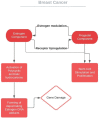Review of the literature on combined oral contraceptives and cancer
- PMID: 36072240
- PMCID: PMC9377820
- DOI: 10.3332/ecancer.2022.1416
Review of the literature on combined oral contraceptives and cancer
Abstract
Millions of women have given preference to the use of combined oral contraceptives (COCs) since its introduction in the 1960s. Both oestrogens and progestogens can regulate proliferation and it is plausible these effects may contribute to carcinogenesis. We aimed to review the accumulated knowledge to date to appreciate the modifying effects combined oral contraceptives may have on carcinogenesis. Our methodology involved a review of the current published literature, paying attention to studies published in the last 20 years. It has been noted that the overall cancer odds do not change with the use of COCs. Increased risk for breast cancer with COC use is not consistently backed in the literature; the results range from no increase in risk to a 20%-30% elevation in risk, and the risk seems to be temporary, limited to recent or current regular COC use. Also, diagnosed breast cancer cases seem to be clinically advanced in ever-users compared to never-users. Data show that the ongoing and prolonged use of COCs may provide diminished risk for endometrial, colorectal and ovarian cancers. Although studies do not clearly support increased risk with COC use in high-risk groups, such as women with family history of cancer or BRCA carriers, local and international guidelines are available for clinical decision-making. For cervical cancer, COCs seem to enhance the risk with more than 5 years of use, and in many studies, this enhanced risk diminishes after discontinuation and restores to those of never-users within 10 years. The relationship between COC use and liver malignancy risk assessments has provided conflicting findings. Some studies have suggested that hormonal contraceptives may increase the risk of not only hepatocellular carcinoma but also intrahepatic cholangiocarcinoma. Combined oral contraceptives are safe and effective and the effects are reversible. Patients who pursue family planning should be warned of possible carcinogenic outcomes, but it should also be explained that-in addition to sexual health advantages-preferring COCs may also decrease the risks of endometrial, colorectal and ovarian cancers.
Keywords: breast cancer; cervical cancer; combined contraceptives; hormonal contraception; liver cancer; ovarian cancer.
© the authors; licensee ecancermedicalscience.
Conflict of interest statement
The authors declare no conflicts of interest.
Figures





References
Publication types
LinkOut - more resources
Full Text Sources
